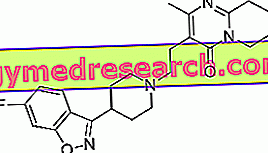Introduction
Calming the cough is what patients ask the doctor as soon as this annoying disorder appears.

Cough is a defense mechanism adopted by the body in an attempt to remove and remove any irritants and / or pathogens found inside the airways. Cough, therefore, is not a disease, but a symptom that can be encountered in more than 100 different diseases.
Since this symptom can be extremely annoying, it can cause burning and irritation of the throat and can promote the appearance of muscle pain due to continuous coughing, soothing the cough is of fundamental importance for the patient's well-being.
How to Calm the Cough
To calm the cough it is first of all essential to understand its cause and identify its type. Therefore, as soon as the disorder appears, it would be good to immediately contact the doctor who - in addition to identifying the type of cough that afflicts the patient - will be able to determine the possible presence of diseases that led to the development of the disorder. Only in this way, in fact, will it be possible to undertake the most suitable treatment to calm the cough.
Possible Causes of Cough
The causes that can give rise to the cough are many, among those most common we remember:
- Inhalation of irritating substances (for example, cigarette smoke, smog, etc.);
- Bacterial, viral or fungal infections;
- Lung diseases (such as, for example, COPD) and other diseases capable of activating the cough reflex;
- Allergies of various kinds.
As can be seen from the above list, there are many causes that can give rise to cough. To be able to calm the cough, the identification of the triggering cause is therefore a determining factor. In fact, while in some cases a simple symptomatic treatment may be sufficient (such as, for example, in the case of cough triggered by viral infections and flu illnesses); in other cases, the treatment to calm the cough may require the use of more specific drugs (as happens, for example, in the case of cough triggered by allergies). In other cases, however, the symptomatic treatment to calm the cough can be combined with a therapy aimed at counteracting the triggering cause, as happens, for example, in the case of cough caused by bacterial infections (in fact, in similar situations, the doctor will prescribe drugs to calm the cough in association with antibiotic drugs).
Type of Cough
In addition to depending on the underlying cause, the treatment used to calm the cough cannot fail to take into account the type of cough that afflicts the patient. In detail, we can basically distinguish two types:
- Fat cough, accompanied by a sputum (phlegm) that can have a different nature;
- Dry cough, in which there is no phlegm.
Below, we will list the main treatments - pharmacological and non-pharmacological - that can be undertaken to calm a different type of cough.
Fat Cough
Drugs to Calm the Fat Cough
To calm the oily cough it is necessary to resort to the use of substances that are able to thin the mucus (phlegm), favoring its elimination.
Therefore, to calm the oily cough, it is necessary to resort to the use of medicines based on active ingredients with mucolytic, mucus regulating and expectorant activity, such as:
- Ambroxol (Mucosolvan®);
- Carbocysteine (Sinecod Tosse®);
- N-acetylcysteine (Fluimucil®);
- Erdosteine (Erdotin®);
- Bromexina (Bisolvon Linctus)
- Guaifenesina (Bronchenol® Sedative and Fluidifier).
The mucolytic and expectorant drugs are able to calm the fat cough through:
- The degradation of the mucoproteins that make up the sputum, thus making catarrhal secretions less dense and viscous and facilitating their expulsion;
- The increase in the aqueous component of the catarrhal secretion, with a consequent increase in its volume and its fluidity;
- The increase in mucociliary activity .
Medications to calm oily cough must be taken orally, in fact, in most cases, they are formulated in the form of syrups.
Please note
To calm the oily cough you should NEVER use cough sedatives, since the expulsion of the phlegm is in itself a defensive mechanism that the body implements in an attempt to remove the harmful substances and / or pathogens that gave rise to the disorder. Furthermore, cough suppressants would favor the accumulation of phlegm in the respiratory tract, obstructing it and further worsening the situation. Therefore, expectoration should be encouraged and not hindered.
In any case, in case of the appearance of a fat cough, before taking any type of medication, it is advisable to consult your doctor, in order to identify the cause.
Natural Remedies for Calming the Fat Cough
To calm the fatty cough, the use of natural remedies could be useful. However, even in these cases, it is always good to contact your doctor in advance.
The natural remedies useful for calming the oily cough are those with expectorant, fluidifying and balsamic activity . Among those most used, we recall:
- Licorice : it is a plant with expectorant and anti-inflammatory properties, therefore, it can be useful in calming fat cough and in contrasting respiratory tract diseases characterized by the formation of phlegm. To calm the oily cough, licorice can be taken orally, for example, using its roots in infusions.
- Fennel : is a plant that contains substances with expectorant activity that are particularly useful for calming oily cough. Fennel can be taken in the form of an oral (semi-pulverized) drug (400 mg three times a day after meals), or in the form of an infusion, or even the essential oil can be taken (3-5 drops per day).
- Anise : it is a plant with expectorant and balsamic properties and for this reason it can be useful to calm oily cough. In these cases it is possible both to take the mother tincture orally and to use the essential oil to effect fumigations.
- Eucalyptus essential oil : it has balsamic and expectorant activity, in case of oily cough it can be used to perform fumigations.
Did you know that ...
Among the natural remedies for calming the oily cough is also snail syrup, a particular type of food supplement to which fluidifying and expectorant properties are attributed.
Homeopathy
Even homeopathic medicine offers some remedies to calm the fat cough. Among these, we recall:
- Hydrastis 6CH : is a homeopathic remedy of vegetable origin, to calm oily cough with bronchial catarrh the recommended dose is 3 granules every 3 hours.
- Ipecacuana 4CH : another homeopathic plant-based remedy used to calm periodic and suffocating oily cough at a dose of 3 granules every 2 hours.
- Kalium bichromicum 7CH : is a homeopathic remedy of mineral origin, it is used to calm the fat cough with very dense and difficult to expel sputum at the dose of 3 granules every 2-3 hours.
Please note
The practices described above for calming the fatty cough are not accepted by medical science, they have not been subjected to experimental tests conducted with scientific methods or have not passed them. Such practices, therefore, could be ineffective or even be dangerous to health . The information given is for illustrative purposes only.
Dry cough
Drugs to Calm Dry Cough
To calm the dry cough it is necessary to resort to the so-called antitussive drugs or cough sedatives, that is to say drugs that are able to hinder the tussigenous reflex.
Of course, also in this case, before taking any drug to calm dry cough (even if over the counter or without a prescription), it is always good to go to your doctor, in order to determine the presence of any underlying diseases that gave rise to the disorder.
However, to calm the dry cough, the doctor can prescribe the administration of drugs containing active ingredients of an opioid nature, such as codeine (Paracodina®) and dextromethorphan (Aricodil Tosse®); or containing non-opioid active ingredients, such as butamirate (Sinecod Tosse Sedativo®).
These drugs are able to calm the dry cough through a central mechanism of action. In fact, they block the nerve center of the cough which, therefore, is no longer able to induce the cough reflex.
Cough sedatives are usually found in the form of oral drops or syrups which, of course, must be administered by mouth.
Did you know that ...
In some cases, dry cough may be caused by inhaling foreign bodies (for example, dust), or by inhaling irritants (such as, for example, smog or cigarette smoke). In such circumstances, it is usually not necessary to resort to drugs to calm the dry cough, since this defensive mechanism implemented by the body tends to be self-limiting, resolving itself as soon as you move away from the trigger agent. If not, then a doctor's consultation is essential.
Natural Remedies for Calming Dry Cough
Even to calm the dry cough it is possible to resort to some natural remedies, the use of which, however, should be carried out only after consulting your doctor.
Natural remedies that can be used to calm dry cough must have antitussive (cough sedatives) and emollient properties, in order to alleviate the annoying irritations resulting from continuous coughing. Among those most used, we recall:
- Ivy : the extracts of this plant have widely proven antitussive properties, so much so that its extracts are part of the composition of real drugs to calm dry cough (Hederix Plan®).
- Altea : is a plant containing active ingredients from the expectorant action, to calm the oily cough it can be useful to take the leaves in the form of an infusion. Furthermore - thanks to its mucilage content - it has an emollient action, very useful for relieving cough-induced throat.
- Linden : it is a plant with antitussive and emollient properties, therefore of fundamental properties to calm dry cough and, at the same time, to relieve irritation of the resulting throat. Generally, in these cases, the infused dried flowers are used.
- Honey : it does not have sedative coughing properties, so it is not properly used to calm dry cough, but is used as an excellent emollient remedy to relieve the throat irritated by this type of cough.
Homeopathy
Among the various homeopathic remedies available, there are certainly those that can be used to calm dry cough. In this regard, we recall a few:
- Ferrum phosphoricum 7CH : is a homeopathic remedy of mineral origin that can be used to calm dry cough at a dose of 3 granules every 3 hours.
- Hepar sulfur 5CH : another homeopathic remedy of mineral origin used to calm dry cough accompanied by tickling of the throat and then turns into a fat cough. The recommended dose is 3 granules 4 times a day.
- Ignatia amara 7CH : is a homeopathic remedy of vegetable origin, it can be used to calm spasmodic dry cough in the dose of 3 granules every 2-3 hours.
- Nux vomica 7CH : is another homeopathic remedy of vegetable origin used to calm dry cough, in particular continuous, persistent and associated with a tingling sensation or itchy throat. The usual dose is 3 granules every 2-3 hours.
Please note
The practices described above to calm dry cough are not accepted by medical science, have not been subjected to experimental tests conducted with scientific methods or have not passed them. Such practices, therefore, could be ineffective or even be dangerous to health . The information given is for illustrative purposes only.
Allergic cough
How to Calm Allergic Cough
As you can easily guess from its very name, the allergic cough is caused by diseases that are allergic in nature. Classic examples of diseases of this type are allergic rhinitis and allergic asthma.
In the presence of similar pathologies, the use of expectorants or cough suppressants is not usually used, but the therapeutic strategy is aimed at treating the allergic disease that triggered the tussive reflex. In these cases, therefore, the doctor will prescribe the administration of specific drugs, such as antihistamines, corticosteroids or asthma sufferers .
Cough from Reflux
How to Calm Cough with Gastroesophageal Reflux
Gastroesophageal reflux cough is usually dry and manifests itself following the rise of acids from the stomach to the digestive tract.
To calm this type of cough no antitussives and sedatives are used, but it is necessary to treat the primary cause that triggered the symptom, therefore the gastroesophageal reflux. In this regard, therefore, proton pump inhibitors, H2-receptor antagonist drugs, misoprostol, antacid drugs and prokinetic drugs are used.



